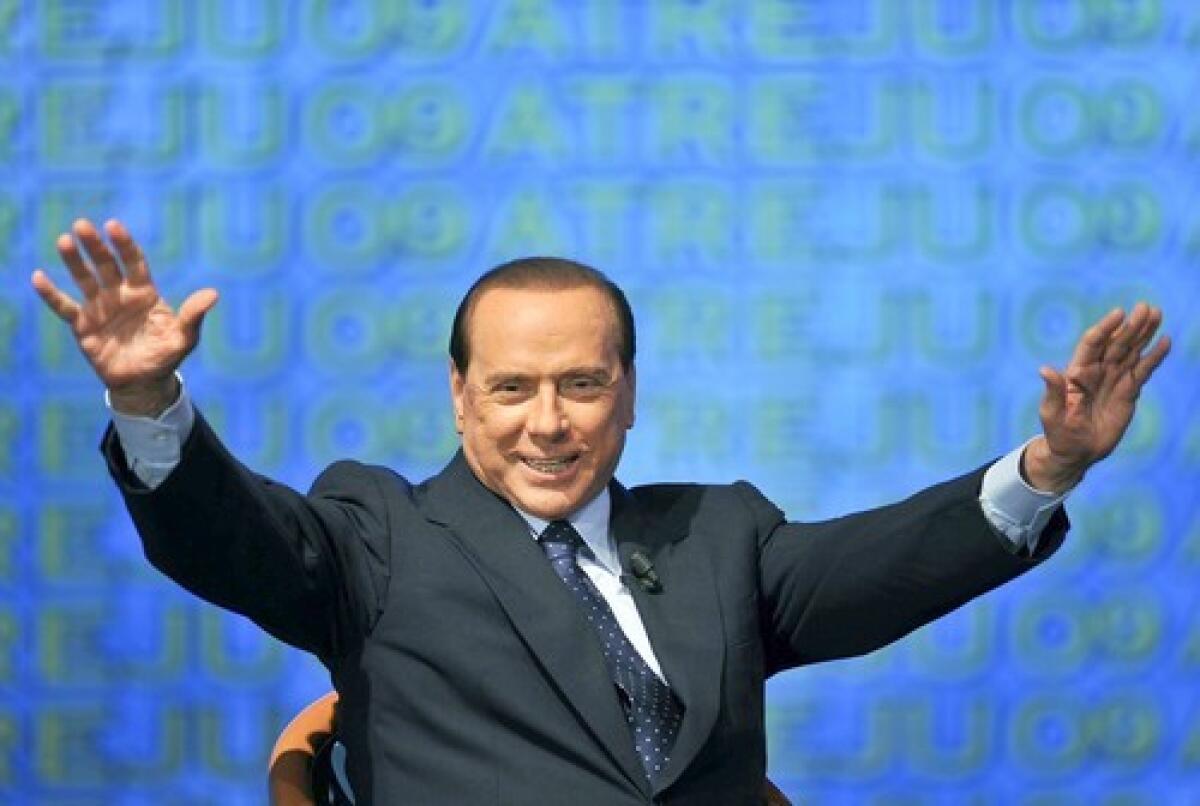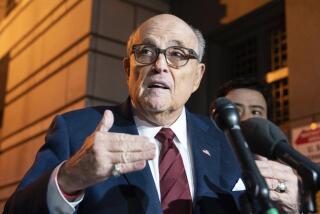Italy political scientist likens Berlusconi to a sultan

- Share via
Reporting from Rome — Italian Prime Minister Silvio Berlusconi has spent a lot of time this week talking about one of his favorite subjects: Silvio Berlusconi. On Thursday, he called himself the best prime minister “that Italy has had in its 150-year history.” Earlier in the week, he proclaimed, “The majority of Italians in their hearts would like to be like me, and see themselves in me and in how I behave.”
Giovanni Sartori is a preeminent Italian political scientist and columnist for the newspaper Corriere della Sera. His recent book, “Il Sultanato” (The Sultanate), focuses on Berlusconi’s leadership style. In your book “The Sultanate” you describe Berlusconi as behaving like a sultan. He is often described by his detractors as having dictatorial tendencies, but why do you specifically use the analogy of a sultan?
Berlusconi has created a court-like system with a harem . . . the closest analogy thus seems to be a sultanate. To be sure, dictatorial tendencies are implied or forthcoming. However, if Berlusconi actually was a dictator, I would probably be in prison, and certainly I would be totally silenced. Many foreigners have difficulty understanding Berlusconi’s continued popularity. How does he maintain his credibility through so many scandals? Is it solely explained by the lack of a credible opposition? Or is there something more, something deeper to his appeal with the Italian electorate?
Berlusconi comes from show business. So he has show charm and manners. I call him an “agreeable rascal”; however, the fundamental element of his popularity is the fact that he controls 90-95% of all Italian television. . . . For instance, the main public television channel never talks of his scandals. He has an octopus-like hold on almost all the media, newspapers included. Having said this, it is also a fact that the Italian left is a very poor and inefficient opposition. Does Mr. Berlusconi’s control over a sizable portion of Italy’s media put Italian democracy at risk in a tangible way?
Yes, I implicitly said so before. It is not a dictatorship, because I am not in prison, but the tendencies are there. Is the Italian concept of democracy different from that of the U.S. or its partners in the rest of Europe? Does an authoritarian style of government fit better with Italian values?
The Italian concept of democracy as expressed in the constitution amounts to a very normal parliamentary system. Berlusconi’s concept of democracy is, instead, highly populist and ego-centered. I do not believe, however, that an authoritarian style of government fits better with Italian values. Without Berlusconi, Italians would be normal democrats. Mr. Berlusconi began his political career on an anti-communist ticket, and he still uses strong anti-communist rhetoric. Does this still resonate with the electorate, or have other factors taken over, such as fear of immigration or security?
The strong anti-communist rhetoric still works for all the Italians that neither like nor trust the Italian left, but illegal immigration is also a strong element of anti-leftism -- it plays well in his hand. The “co-star” of his latest scandal, Noemi, the 18-year-old Neapolitan girl, claimed in an interview that she was promised help in becoming either an actress or a politician. Indeed, many ex-models, actresses and starlets are in his party and his government. Is Italian politics in danger of becoming a kind of reality show?
A harem-like reality show, as I noted at the beginning. . . . As you know, the polls have indicated a very small decline in the popularity of Berlusconi, which is still very high. So this sexual scandal, which in any other democracy would pull down a government overnight, doesn’t reach many Italians. Being a private matter, it cannot be discussed on a serious channel, so Italians just maybe sympathize with him because maybe many Italians would like to have a harem too. But the point is that it doesn’t reach the public opinion much because even the Corriere della Sera is very cautious. This latest scandal seemed to have touched a raw nerve with the Vatican and the Catholic press. Is this likely to hurt Berlusconi’s standing?
Certainly, the Vatican dislikes the sexual exhibitionism, if I may call it so, of Italy’s prime minister, but very cautiously because the Vatican has many stakes at play here. For instance, the financing of private schools, basically Catholic schools, . . . enormous fiscal privileges, etc. The Vatican and Berlusconi are thus blackmailing each other. It is a very careful tug-of-war. Berlusconi’s presence on the Italian political scene does seem to have coincided with an end to Italy’s frequent elections. Is this principally owing to his role, and how will the Italian political scene change once he is gone?
If he stays on two or three years, then the new situation will be very different than if he stays on for 20 years. So when will Berlusconi go? That is the question. Many observers say he will go soon enough because he is worn out. I have the impression that if his health holds, he will stay on as long as he can, not giving up.
De Cristofaro is a special correspondent.
More to Read
Sign up for Essential California
The most important California stories and recommendations in your inbox every morning.
You may occasionally receive promotional content from the Los Angeles Times.










